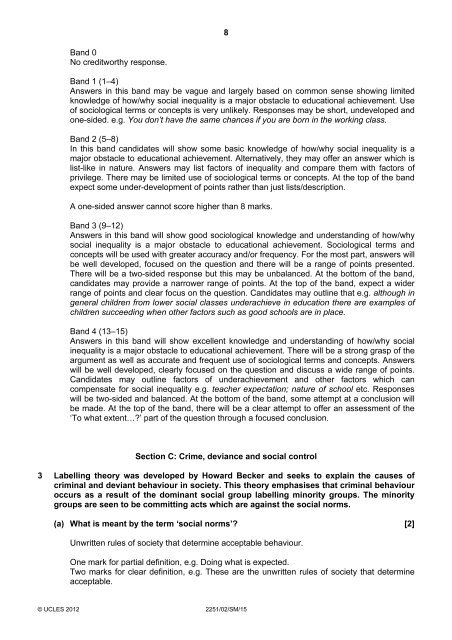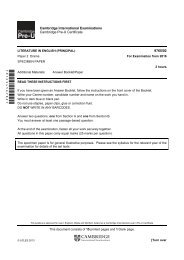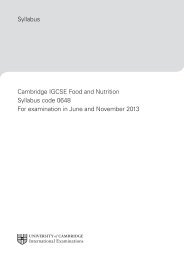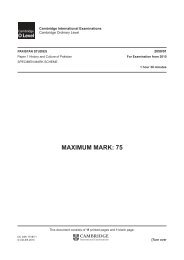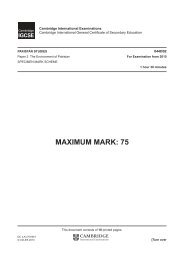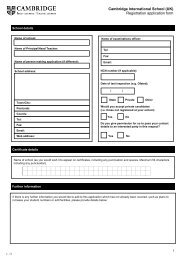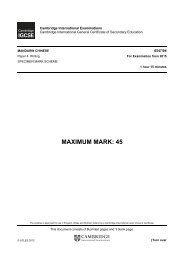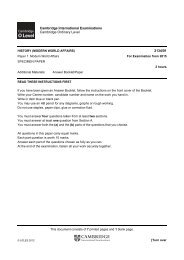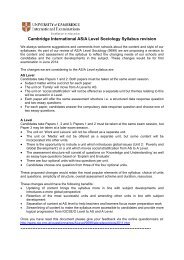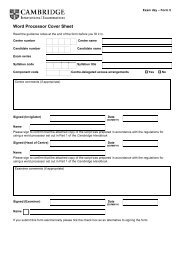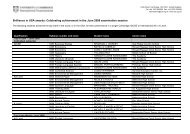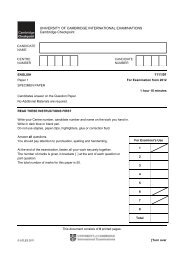MAXIMUM MARK: 70 - Cambridge International Examinations
MAXIMUM MARK: 70 - Cambridge International Examinations
MAXIMUM MARK: 70 - Cambridge International Examinations
Create successful ePaper yourself
Turn your PDF publications into a flip-book with our unique Google optimized e-Paper software.
8Band 0No creditworthy response.Band 1 (1–4)Answers in this band may be vague and largely based on common sense showing limitedknowledge of how/why social inequality is a major obstacle to educational achievement. Useof sociological terms or concepts is very unlikely. Responses may be short, undeveloped andone-sided. e.g. You don’t have the same chances if you are born in the working class.Band 2 (5–8)In this band candidates will show some basic knowledge of how/why social inequality is amajor obstacle to educational achievement. Alternatively, they may offer an answer which islist-like in nature. Answers may list factors of inequality and compare them with factors ofprivilege. There may be limited use of sociological terms or concepts. At the top of the bandexpect some under-development of points rather than just lists/description.A one-sided answer cannot score higher than 8 marks.Band 3 (9–12)Answers in this band will show good sociological knowledge and understanding of how/whysocial inequality is a major obstacle to educational achievement. Sociological terms andconcepts will be used with greater accuracy and/or frequency. For the most part, answers willbe well developed, focused on the question and there will be a range of points presented.There will be a two-sided response but this may be unbalanced. At the bottom of the band,candidates may provide a narrower range of points. At the top of the band, expect a widerrange of points and clear focus on the question. Candidates may outline that e.g. although ingeneral children from lower social classes underachieve in education there are examples ofchildren succeeding when other factors such as good schools are in place.Band 4 (13–15)Answers in this band will show excellent knowledge and understanding of how/why socialinequality is a major obstacle to educational achievement. There will be a strong grasp of theargument as well as accurate and frequent use of sociological terms and concepts. Answerswill be well developed, clearly focused on the question and discuss a wide range of points.Candidates may outline factors of underachievement and other factors which cancompensate for social inequality e.g. teacher expectation; nature of school etc. Responseswill be two-sided and balanced. At the bottom of the band, some attempt at a conclusion willbe made. At the top of the band, there will be a clear attempt to offer an assessment of the‘To what extent…?’ part of the question through a focused conclusion.Section C: Crime, deviance and social control3 Labelling theory was developed by Howard Becker and seeks to explain the causes ofcriminal and deviant behaviour in society. This theory emphasises that criminal behaviouroccurs as a result of the dominant social group labelling minority groups. The minoritygroups are seen to be committing acts which are against the social norms.(a) What is meant by the term ‘social norms’? [2]Unwritten rules of society that determine acceptable behaviour.One mark for partial definition, e.g. Doing what is expected.Two marks for clear definition, e.g. These are the unwritten rules of society that determineacceptable.© UCLES 2012 2251/02/SM/15


